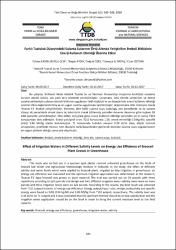| dc.contributor.author | Kamburoğlu Çebi, Ulviye | |
| dc.contributor.author | Aydın, Başak | |
| dc.contributor.author | Özer, Selçuk | |
| dc.contributor.author | Altıntaş, Süreyya | |
| dc.contributor.author | Öztürk, Ozan | |
| dc.date.accessioned | 2022-05-11T14:43:13Z | |
| dc.date.available | 2022-05-11T14:43:13Z | |
| dc.date.issued | 2018 | |
| dc.identifier.issn | 2148-3647 | |
| dc.identifier.issn | 2148-3647 | |
| dc.identifier.uri | https://app.trdizin.gov.tr/makale/TWprME1qVXhNUT09 | |
| dc.identifier.uri | https://hdl.handle.net/20.500.11776/9481 | |
| dc.description.abstract | Bu çalışma, Kırklareli ilinde Atatürk Toprak Su ve Tarımsal Meteoroloji Araştırma Enstitüsü arazisinekurulan plastik örtülü, yay çatılı sera tesisinde yürütülmüştür. Çalışmada, örtü altında yetiştirilen ve damlasulama yöntemiyle sulanan brokoli bitkisine uygulanan farklı tuzluluk ve su düzeylerinin enerji kullanım etkinliğiüzerine etkisi değerlendirilmiş ve en uygun sulama uygulaması belirlenmiştir. Araştırmada bitki materyali olarak‘Ksonat F1’ brokoli yetiştirilmiştir. Deneme, dört farklı sulama suyu tuzluluğu ana parsellerde ve üç sulamadüzeyi alt parsellerde olmak üzere üç tekerrürlü olarak bölünmüş parseller deneme desenine göre toplam 36adet parselde yürütülmüştür. Elde edilen sonuçlara göre, enerji kullanım etkinliği yönünden en iyi sonuç T1S2konusundan elde edilmiştir. Enerji çıktı/girdi oranı T1S2 konusunda 1.00, enerji verimliliği 0.54kg/MJ, spesifikenerji 1.86 MJ/kg olarak bulunmuştur. T1 konusunda tuzluluk seviyesi 0.38 ds/m olup, düşük tuzlulukseviyesinde, profildeki mevcut nem düzeyini tarla kapasitesine getirecek düzeyde sulama suyu uygulamasınınen uygun yöntem olduğu sonucuna ulaşılmıştır. | en_US |
| dc.description.abstract | This study was carried out in a quonset type plastic covered unheated greenhouse on the lands of Atatürk Soil Water and Agricultural Meteorology Institute in Kırklareli. In the study, the effect of different salinity and water levels which were applied to broccoli plant, irrigated by drip irrigation in greenhouse, on energy use efficiency was evaluated and the optimum irrigation application was determined. In the research, ‘Ksonat F1’ type broccoli was grown as plant material. The trial was carried out on 36 parcels with three repetitions according to split parcels trial design and four different irrigation water salinity levels were on main parcels and three irrigation levels were on sub parcels. According to the results, the best result was obtained from T1S2 subject in terms of energy use efficiency. Energy output/input ratio, energy productivity and specific energy were found as 1.00, 0.54 kg/MJ and 1.86 MJ/kg from T1S2 subject, respectively. The salinity level was 0.38 ds/m on T1 subject and it was concluded that the optimum method should be on low salinity level and the irrigation water application should be on the level in order to bring the current moisture level to the field capacity. | en_US |
| dc.language.iso | tur | en_US |
| dc.rights | info:eu-repo/semantics/openAccess | en_US |
| dc.subject | Tarımsal Ekonomi ve Politika | en_US |
| dc.subject | Ziraat Mühendisliği | en_US |
| dc.subject | Bahçe Bitkileri | en_US |
| dc.subject | Bitki Bilimleri | en_US |
| dc.subject | Ziraat | en_US |
| dc.subject | Toprak Bilimi | en_US |
| dc.subject | Biyoloji Çeşitliliğinin Korunması | en_US |
| dc.subject | Biyoloji | en_US |
| dc.subject | Ekoloji | en_US |
| dc.subject | Entomoloji | en_US |
| dc.subject | Çevre Bilimleri | en_US |
| dc.subject | Çevre Mühendisliği | en_US |
| dc.title | Farklı Tuzluluk Düzeyindeki Sulama Sularının Örtü Altında Yetiştirilen Brokoli Bitkisinin Enerji Kullanım Etkinliği Üzerine Etkisi | en_US |
| dc.title.alternative | Effect of Irrigation Waters in Different Salinity Levels on Energy Use Efficiency of Broccoli Plant Grown in Greenhouse | en_US |
| dc.type | article | en_US |
| dc.relation.ispartof | Türk Tarım ve Doğa Bilimleri Dergisi | en_US |
| dc.department | Fakülteler, Ziraat Fakültesi, Bahçe Bitkileri Bölümü | en_US |
| dc.identifier.volume | 5 | en_US |
| dc.identifier.issue | 2 | en_US |
| dc.identifier.startpage | 100 | en_US |
| dc.identifier.endpage | 108 | en_US |
| dc.institutionauthor | Altıntaş, Süreyya | |
| dc.identifier.trdizinid | TWprME1qVXhNUT09 | en_US |



















